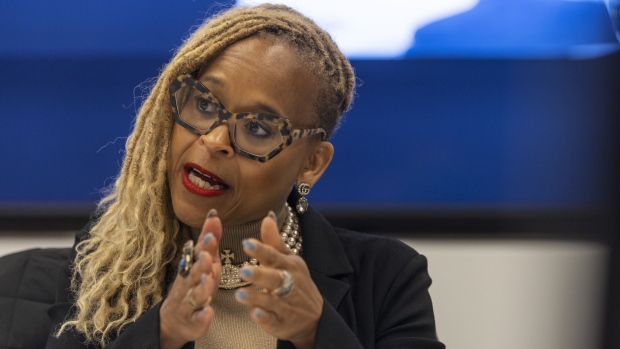Oct 3, 2022
Unilever’s New US Boss Defends Brands of Purpose
, Bloomberg News

(Bloomberg) -- Esi Eggleston Bracey has led some of the world’s most recognized beauty brands, from Covergirl to Max Factor, over a career spanning three decades. Her next challenge: igniting growth at Unilever Plc’s US business.
The executive, who joined London-based Unilever in 2018, took over as president of the US business on July 1 in conjunction with a companywide revamp involving job cuts and regrouping the business into five segments. She also oversees the company’s personal-care portfolio in North America, making her responsible for well-known brands such as Dove and Axe.
The US accounted for 19% of Unilever’s 52.4 billion euros ($51.4 billion) in sales last year, making it the largest market for the company. The unit had been posting lackluster growth before a boom fueled by the Covid-19 pandemic. Meanwhile, the parent company is dealing an activist investor and recently announced Chief Executive Officer Alan Jope would be retiring at the end of 2023 without naming a replacement.
Bloomberg recently spoke with Eggleston Bracey about how she plans to hold onto those sales gains from the past two years, and navigating other challenges.
Revenue growth at Unilever’s US business was just 1% in the years preceding the pandemic and then surged to 7.7% in 2020 before settling at about half that rate last year. What’s the plan to maintain some of that?
The pandemic era has unlocked new opportunities for growth that we will keep benefiting from. The bath and body business, for example. The healthy food businesses.
Moreover, over-serving the underserved leads to growth. Forty percent of Americans are people of color. It’s incredible to see one out of two babies born are babies of color. So, what does that mean? More needs for textured hair care and for melanin skincare. Unilever acquired the SheaMoisture brand and its collection of products through Sundial Brands, which saw explosive growth during the pandemic. Why? Because hair salons were closed. We became an in-home salon.
There is a lot of debate about how much of the consumer behaviors picked up during the pandemic will stick around. What stands out to you?
The pandemic ignited this whole idea of wellbeing. And that’s a massive growth opportunity for Unilever, if you think about how you can be of service in that space of wellbeing. We launched a whole bath and body business during Covid and it continues to thrive — Beloved by Love Beauty and Planet. Our e-commerce business also continues to grow. We’re still seeing double-digit growth there.
Unilever has been criticized for spending too much time weaving purpose-driven activities into marketing. The company also had a row with its Ben & Jerry’s ice cream division over distribution in Palestinian territory occupied by Israel. What’s the future of purpose at the company?
(Eggleston Bracey declined to comment on the Ben & Jerry’s situation.)
The company sees purpose as an accelerator. You figure out products and services to deliver on needs. What do people really need? If we talk about Dove, they need their skin taken care of. We provide products of superior care. But we also know people want to be included and feel beautiful, so we show diversity of people in our campaigns and our advertising and show that the products work on all sorts of skin types.
We know that purpose is not a substitute for the fundamentals.
Unilever has recently pushed into higher-priced products as a way to boost sales. Does that still make sense with inflation eating into America’s spending power?
At Unilever, we have a portfolio for good times, and we have portfolio for challenging times because we have entry-price-point products. If you look, there’s premiumization across foods, and there’s premiumization across beauty. What we’re seeing is the market continues to premiumize because people want more value.
I was betting wrongly during Covid that the market was going to go down to straight affordability. That did not happen. And thank goodness I had a portfolio that I could pivot into.
You’ve been active in helping pass CROWN Act laws, which ban discrimination against Black hairstyles and textures, in nearly two dozen states. Is there any disappointment that there hasn’t been a nationwide law passed?
I am so encouraged by the CROWN Act. Disappointment is nowhere in the vocabulary. As a Black woman, I have instincts and insight, but officially talking to Black women we heard two things: the impact of colorism, racism, and the impact of not being honored for our textured hair. Through that, it was clear that we could do something about this area of textured hair.
We’re not going to stop until there’s national legislation.
Editor’s note: This interview has been edited and condensed.
©2022 Bloomberg L.P.


